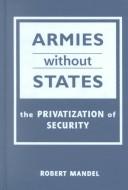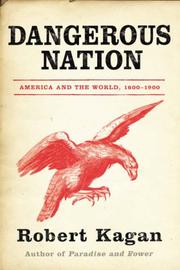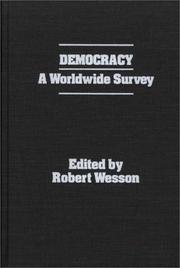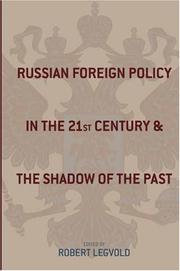| Listing 1 - 10 of 402 | << page >> |
Sort by
|

ISBN: 1588260666 9781588260666 Year: 2002 Publisher: Boulder, Colo. Lynne Rienner Publishers
Abstract | Keywords | Export | Availability | Bookmark
 Loading...
Loading...Choose an application
- Reference Manager
- EndNote
- RefWorks (Direct export to RefWorks)
huurlingenorganisatie --- Polemology --- National security. --- Private security services. --- Military policy. --- Internal security. --- Security, International. --- Private security services --- Military policy --- Internal security --- Security, International
Book
ISBN: 0801457610 0801458854 0801478065 9780801458859 9780801447853 0801447852 9780801457616 9780801478062 Year: 2010 Volume: *21 Publisher: Ithaca, New York London
Abstract | Keywords | Export | Availability | Bookmark
 Loading...
Loading...Choose an application
- Reference Manager
- EndNote
- RefWorks (Direct export to RefWorks)
The U.S. government spends enormous resources each year on the gathering and analysis of intelligence, yet the history of American foreign policy is littered with missteps and misunderstandings that have resulted from intelligence failures. In Why Intelligence Fails, Robert Jervis examines the politics and psychology of two of the more spectacular intelligence failures in recent memory: the mistaken belief that the regime of the Shah in Iran was secure and stable in 1978, and the claim that Iraq had active WMD programs in 2002. The Iran case is based on a recently declassified report Jervis was commissioned to undertake by CIA thirty years ago and includes memoranda written by CIA officials in response to Jervis's findings. The Iraq case, also grounded in a review of the intelligence community's performance, is based on close readings of both classified and declassified documents, though Jervis's conclusions are entirely supported by evidence that has been declassified. In both cases, Jervis finds not only that intelligence was badly flawed but also that later explanations-analysts were bowing to political pressure and telling the White House what it wanted to hear or were willfully blind-were also incorrect. Proponents of these explanations claimed that initial errors were compounded by groupthink, lack of coordination within the government, and failure to share information. Policy prescriptions, including the recent establishment of a Director of National Intelligence, were supposed to remedy the situation. In Jervis's estimation, neither the explanations nor the prescriptions are adequate. The inferences that intelligence drew were actually quite plausible given the information available. Errors arose, he concludes, from insufficient attention to the ways in which information should be gathered and interpreted, a lack of self-awareness about the factors that led to the judgments, and an organizational culture that failed to probe for weaknesses and explore alternatives. Evaluating the inherent tensions between the methods and aims of intelligence personnel and policymakers from a unique insider's perspective, Jervis forcefully criticizes recent proposals for improving the performance of the intelligence community and discusses ways in which future analysis can be improved.
Intelligence service --- Iraq War, 2003-2011 --- Weapons of mass destruction --- Evaluation --- Military intelligence --- Evaluation. --- United States. --- Iran --- History --- Anglo-American Invasion of Iraq, 2003-2011 --- Dawn, Operation New, 2010-2011 --- Gulf War II, 2003-2011 --- Iraqi Freedom, Operation, 2003-2010 --- New Dawn, Operation, 2010-2011 --- Operation Iraqi Freedom, 2003-2010 --- Operation New Dawn, 2010-2011 --- Operation Telic, 2003-2011 --- Persian Gulf War, 2003-2011 --- Telic, Operation, 2003-2011 --- Counter intelligence --- Counterespionage --- Counterintelligence --- Intelligence community --- Secret police (Intelligence service) --- Agjencia Qendrore e Inteligjencës --- Central Intelligence Agency (U.S.) --- CIA (Central Intelligence Agency (U.S.)) --- CIP (United States. Centrālās izlūkošanas pārvalde) --- Mei-kuo chung yang chʻing pao chü --- National Security Council (U.S.). --- Si Aing Ei --- T︠S︡entralʹnoe razvedyvatelʹnoe upravlenie SShA --- T︠S︡RU SShA --- T︠S︡RU (T︠S︡entralʹnoe razvedyvatelʹnoe upravlenie SShA) --- ЦРУ США --- ЦРУ (Центральное разведывательное управление США) --- Центральное разведывательное управление США --- ארצות הברית. --- 美國. --- War on Terrorism, 2001-2009 --- Public administration --- Research --- Disinformation --- Secret service --- National Security Council (U.S.) --- CIA (Central Intelligence Agency) --- Polemology --- United States --- Case studies --- United States. Central Intelligence Agency --- Revolution, 1979 --- Iraq --- Intelligence service - United States - Evaluation - Case studies --- Iraq War, 2003-2011 - Military intelligence - United States - Evaluation --- Weapons of mass destruction - Iraq --- Iran - History - Revolution, 1979 --- United States of America

ISBN: 0714649929 Year: 2001 Publisher: London Cass
Abstract | Keywords | Export | Availability | Bookmark
 Loading...
Loading...Choose an application
- Reference Manager
- EndNote
- RefWorks (Direct export to RefWorks)
History of Eastern Europe --- Polemology --- anno 1800-1999 --- Chechnia --- Polemologyanno 1800-1999Chechnia

ISBN: 0944029922 Year: 2004 Publisher: Washington, D.C. Washington Institute for Near East Policy
Abstract | Keywords | Export | Availability | Bookmark
 Loading...
Loading...Choose an application
- Reference Manager
- EndNote
- RefWorks (Direct export to RefWorks)

ISBN: 1843545306 9781843545309 Year: 2006 Publisher: London Atlantic books
Abstract | Keywords | Export | Availability | Bookmark
 Loading...
Loading...Choose an application
- Reference Manager
- EndNote
- RefWorks (Direct export to RefWorks)
International relations. Foreign policy --- World history --- anno 1700-1799 --- anno 1800-1899 --- anno 1600-1699 --- United States --- Etats-Unis --- Foreign relations. --- Relations extérieures --- #KVHA:American Studies --- #KVHA:Geschiedenis; Verenigde Staten --- Relations extérieures --- United States of America
Book
ISBN: 0905118812 Year: 1984 Publisher: London Europa publications
Abstract | Keywords | Export | Availability | Bookmark
 Loading...
Loading...Choose an application
- Reference Manager
- EndNote
- RefWorks (Direct export to RefWorks)
POLITICAL SCIENCE--QUOTATIONS --- Politics [Practical ] --- Quotations, maxims, etc. --- Dictionaries --- Politique --- Citations --- Dictionnaires
Book
ISBN: 9781509501892 9781509501885 1509501886 1509501894 Year: 2016 Publisher: Malden, MA : Polity,
Abstract | Keywords | Export | Availability | Bookmark
 Loading...
Loading...Choose an application
- Reference Manager
- EndNote
- RefWorks (Direct export to RefWorks)
"The 2014 crisis in Ukraine sent a tottering U.S.-Russian relationship over a cliff - a dangerous descent into deep mistrust, severed ties, and potential confrontation reminiscent of the Cold War period. In this incisive new analysis, leading expert on Soviet and Russian foreign policy, Robert Legvold, explores in detail this qualitatively new phase in a relationship that has alternated between hope and disappointment for much of the past two decades. Tracing the long and tortured path leading to this critical juncture, he contends that the recent deterioration of Russia-U.S. relations deserves to be understood as a return to cold war with great and lasting consequences. In drawing out the commonalities between the original cold war and the current confrontation, Return to Cold War brings a fresh perspective to what is happening between the two countries, its broader significance beyond the immediate issues of the day, and how political leaders in both countries might adjust their approaches in order, as the author urges, to make this new cold war "as short and shallow as possible."--
Cold War --- Security, International --- Guerre froide --- Sécurité internationale --- United States --- Russia (Federation) --- Etats-Unis --- Russie --- Foreign relations --- Relations extérieures --- Security, Interntional --- Security, InterntionalUnited States --- United StatesForeign relations --- Sécurité internationale --- Relations extérieures --- Security, International - 21st century --- United States - Foreign relations - Russia (Federation) --- Russia (Federation) - Foreign relations - United States --- United States - Foreign relations - 1989 --- -Cold War

ISBN: 0275924408 Year: 1987 Publisher: New York (N.Y.) Praeger
Abstract | Keywords | Export | Availability | Bookmark
 Loading...
Loading...Choose an application
- Reference Manager
- EndNote
- RefWorks (Direct export to RefWorks)
Democracy --- Authoritarianism --- Démocratie --- Autoritarisme --- History --- Histoire --- -Democracy --- -#SBIB:324H20 --- Self-government --- Political science --- Equality --- Representative government and representation --- Republics --- Authority --- -History --- -Politologie: theorieën (democratie, comparatieve studieën….) --- AuthorityHistory --- Démocratie --- #SBIB:324H20 --- Politologie: theorieën (democratie, comparatieve studieën….)

ISBN: 9780231141222 023114122X 9786613008893 0231512171 1283008890 Year: 2007 Publisher: New York : Columbia University Press,
Abstract | Keywords | Export | Availability | Bookmark
 Loading...
Loading...Choose an application
- Reference Manager
- EndNote
- RefWorks (Direct export to RefWorks)
Because the turbulent trajectory of Russia's foreign policy since the collapse of the Soviet Union echoes previous moments of social and political transformation, history offers a special vantage point from which to judge the current course of events. In this book, a mix of leading historians and political scientists examines the foreign policy of contemporary Russia over four centuries of history. The authors explain the impact of empire and its loss, the interweaving of domestic and foreign impulses, long-standing approaches to national security, and the effect of globalization over time.Contributors focus on the underlying patterns that have marked Russian foreign policy and that persist today. These patterns are driven by the country's political makeup, geographical circumstances, economic strivings, unsettled position in the larger international setting, and, above all, its tortured effort to resolve issues of national identity. The argument here is not that the Russia of Putin and his successors must remain trapped by these historical patterns but that history allows for an assessment of how much or how little has changed in Russia's approach to the outside world and creates a foundation for identifying what must change if Russia is to evolve.A truly unique collection, this volume utilizes history to shed crucial light on Russia's complex, occasionally inscrutable relationship with the world. In so doing, it raises the broader issue of the relationship of history to the study of contemporary foreign policy and how these two enterprises might be better joined.
Russia (Federation) --- Soviet Union --- Russie --- URSS --- Foreign relations. --- Politics and government --- Relations extérieures --- Politique et gouvernement --- Foreign relations --- Soviet UnionForeign relations. --- Relations extérieures --- Russia --- History. --- POLITICAL SCIENCE / International Relations / General. --- Russia (Federation) - Foreign relations --- Russia (Federation) - Politics and government - 1991 --- -Soviet Union - Foreign relations

ISBN: 9780195182927 0195182928 0195346084 1280845554 1429431083 9780195346084 9781280845550 0197710042 9780190293000 0190293004 Year: 2023 Publisher: New York ; Oxford University Press,
Abstract | Keywords | Export | Availability | Bookmark
 Loading...
Loading...Choose an application
- Reference Manager
- EndNote
- RefWorks (Direct export to RefWorks)
Higgs, a highly regarded economic historian, makes pointed, fresh economic arguments against war, showing links between government policies and the economy in a clear, accessible way. He boldly questions, for instance, the widely accepted idea that WWII was the chief reason the Depression-era economy recovered.
War --- Depressions --- Guerre --- Crises économiques --- Economic aspects --- Aspect économique --- United States --- Etats-Unis --- Economic conditions --- Conditions économiques --- 338 <09> <73> --- Economische geschiedenis--Verenigde Staten van Amerika. VSA. USA --- Depressions. --- United States - Economic conditions - 20th century. --- War. --- Business & Economics --- Economic History --- Economic HistoryEconomic aspects --- 338 <09> <73> Economische geschiedenis--Verenigde Staten van Amerika. VSA. USA --- Crises économiques --- Aspect économique --- Conditions économiques --- War - Economic aspects - United States --- Depressions - 1929 - United States --- United States - Economic conditions - 20th century --- World War, 1939-1945 --- Economic policy
| Listing 1 - 10 of 402 | << page >> |
Sort by
|

 Search
Search Feedback
Feedback About
About Help
Help News
News